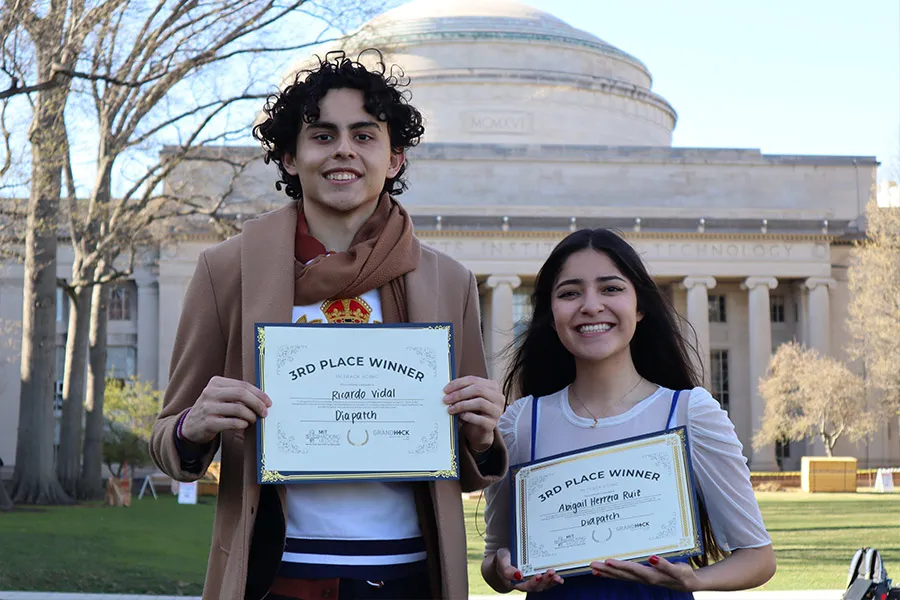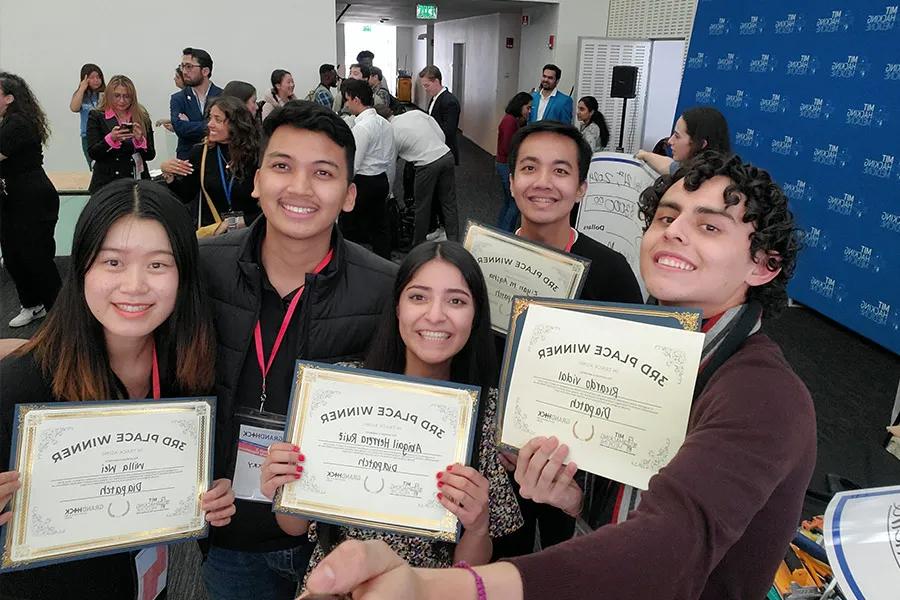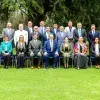Walking through the halls of the Massachusetts Institute of Technology (MIT) during their research stay at Harvard, Tec students Ricardo Rodríguez and Abigail Herrera came across a flyer to participate in MIT Hacking Medicine’s Grand Hack.
With the idea of participating in their first hackathon, Abigail from Nanotechnology Engineering at the Monterrey campus and Ricardo from Biosciences at the Mexico City campus, applied for the competition believing that they couldn’t possibly come in 3rd place in the Elderly category and position themselves as having one of the best projects of this year’s competition.
What went from being a mere experience in Boston became a dream to improve the quality of life of people with diabetes in Mexico and the United States.
Ricardo and Abigail share with CONECTA how they managed to stand out from their master’s and doctoral competitors from around the world with a project born out of their love for Mexico and for their families.

The beginning of the Grand Hack dream
Despite belonging to the same university, Abigail and Ricardo had not met until they began their stay at the Harvard Medical School-affiliated Zhang Lab, where they have been working together.
Meeting another Tec student in Boston and their shared desire of making an impact on society strengthened their friendly relationship, and they decided to participate together in MIT Hacking Medicine’s Grand Hack.
“When they accept you, they send you a link to a platform where you meet the other people who will be participating.
“A few days before the hackathon, I started looking at the participants and saw company CEOs and people with master’s degrees from Harvard and MIT, so I felt sure that we wouldn’t have a chance and we weren’t going to stand out,” says Ricardo.
The first day of the hackathon finally arrived, where Ricardo and Abigail, feeling nervous and uncertain, had to present their solution to a problem in front of undergraduate, master’s, and doctoral students, as well as internationally recognized experts.
“Here in Mexico, diabetes is a very big issue that reduces people’s quality of life.” - Ricardo Rodriguez
“The hackathon is divided into three areas: everyday objects, women’s health, and the elderly. We both chose to be in the elderly area. Ricardo was the first of the two to come forward and present some of the problems.
“He talked about wanting to treat the pressure ulcers that happen to seniors when they’re bedridden for a long time,” Abigail says.
Diabetes: A health problem in Mexico
It was there that the Nanotechnology student recalled her grandfather’s health problem.
“I remember the diabetic ulcers that often appear on my grandfather’s foot and how they’ve been very difficult to heal. Unfortunately, many of the wounds failed to heal, resulting in amputation.”
This is how Abigail and Ricardo, united by their interest and concern in addressing this problem that chiefly affects Mexico and Latin America, ended up forming their team with people from around the world.

The team included a Chinese Ph.D. student from the Harvard School of Medicine, an Indonesian doctor from Oxford University, an Indonesian biomedical doctor working for Pfizer, and a U.S. entrepreneur.
One of the first things the members discussed was that diabetes is not a common disease in other countries outside of Mexico, so they were unaware of the seriousness of the problem of diabetic ulcers.
“Here in Mexico, diabetes is an issue that’s very present today. We hear all the time that it’s a very serious problem in the country and that it reduces people’s quality of life.
“In the beginning, I proposed a hydrogel patch for another use, and that’s when I was told to use this idea of regenerative medicine,” explains the Biosciences student.
“About 50% of patients in Mexico over the age of 60 with an ulcer will end up needing an amputation.” - Abigail Herrera
They worked for two days on the proposal of a patch that would promote a quicker healing of wounds caused by these ulcers, preventing the situation from leading to amputation.
After a weekend of research on the subject, it was time to present the “Dia Patch” (Day Patch) proposal to the jury.
“We’d seen the other presentations, and even though we’d performed well, this year’s sponsor focused on Artificial Intelligence, and we were the only team that hadn’t applied any technology to its project, so we thought they were going to disqualify us.
“When they said we’d won third place, I felt like crying because as undergraduates we were on a par with and even beat people who were Harvard graduates. I think making such a big problem in Mexico visible from here in Boston is a very good thing,” says Abigail.
The students add that this recognition encourages them to improve the quality of life of thousands of Mexicans and to spread awareness of the impact of diabetes and its consequences on people’s health.
“About 50% of patients in Mexico over the age of 60 with an ulcer will end up needing an amputation, which is usually done in public hospitals and decreases their life expectancy. In the long run, it’s much more costly for social security.
“My intention is to come back here to Boston to do a master’s or doctorate degree because this is where the investment is and where we can get the resources to bring to Mexico,” Abigail adds.
Ricardo also shares his desire to remain involved in the research area.
“My goal is to study for a Ph.D. at Harvard, and I’d like to focus on the technology and biomedical research side, to take all these new technologies and apply them to a medical problem.”
“As undergraduates, we were on a par with and even beat people who were Harvard graduates.” - Abigail Herrera
About MIT Hacking Medicine’s Grand Hack
MIT Hacking Medicine is an MIT organization dedicated to organizing hackathons around the world.
Its main event is the Grand Hack held at MIT in Boston, Massachusetts.
With a track record of 10 years, they have been in more than 30 countries, organized more than 200 hackathons, and helped more than 50 companies form and raise more than 2.5 billion dollars.
The students explain that the mission of this organization is to bring together talent from around the world in one place to focus on solving health problems.
READ MORE:





